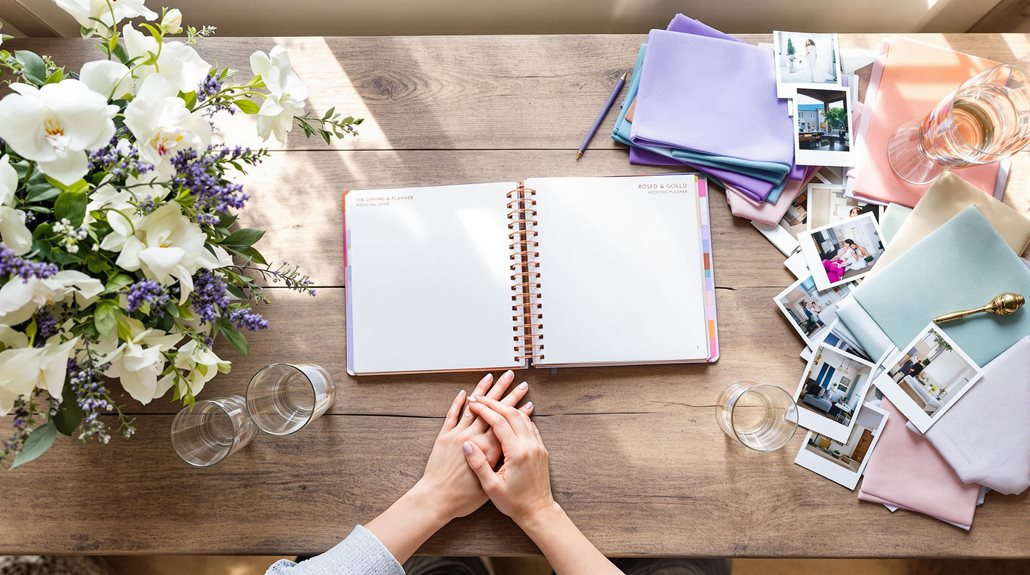
Inclusive and Accessible Wedding Planning for LGBTQ+ Couples: Tips and Resource Guide
Share
Planning your LGBTQ+ celebration is an exciting journey, and here in the UK, we've seen some absolutely gorgeous weddings that beautifully reflect each couple's unique story. Having coordinated several ceremonies in lovely venues from Brighton to Edinburgh, I've found that partnering with the right inclusive suppliers makes all the difference.
Start your search 12-18 months ahead for key team members like photographers and wedding coordinators who genuinely understand and celebrate our community. Look for those who naturally use correct pronouns and proudly display their experience with LGBTQ+ celebrations in their portfolios - brilliant examples are becoming more common across British wedding fairs and online directories.
When viewing venues, particularly our beautiful historic properties and boutique hotels, ensure they offer gender-neutral facilities and proper accessibility. I've seen wonderful celebrations at places like Manchester's Victoria Baths and Cornwall's Eden Project, where staff training in inclusive hospitality truly shines through.
Building your support network is vital to maintaining healthy boundaries.
Remember, your special day should reflect who you are as a couple - whether a cosy village hall gathering or a grand celebration in a Scottish castle. The key is working with people who understand and champion your vision from the very start.
Key Takeaways
- Partner with LGBTQ+ experienced vendors who demonstrate genuine inclusivity through their marketing, communication style, and previous work examples.
- Create a supportive environment by prioritising guests who celebrate your relationship and setting clear boundaries with non-affirming family members.
- Select venues that offer gender-neutral facilities, flexible layouts, and explicit policies supporting LGBTQ+ celebrations.
- Personalise your ceremony by blending traditional elements with unique rituals that reflect your values and relationships.
- Establish a comprehensive timeline starting 12-18 months ahead, including venue booking, vendor selection, and necessary legal documentation.
Building Your Inclusive Wedding Team
Success in planning your LGBTQ+ wedding starts with assembling a team of vendors who deeply understand and celebrate your unique vision.
When evaluating potential vendors, look for those who demonstrate authentic experience with LGBTQ+ weddings and maintain inclusive language across their marketing materials, websites, and social media presence.
During your vendor communication, pay attention to how they respond to your specific needs and whether they naturally use your preferred pronouns and terminology.
Request to see examples of their previous LGBTQ+ weddings, and don't hesitate to ask about their experience serving varied couples.
A professional wedding planner or coordinator with a wide network of inclusive vendors can significantly enhance your planning experience and reduce stress by negotiating contracts with logistical excellence that protect your financial interests and ensure a seamless event.
Carefully review their inclusive contracts to ensure they explicitly state their commitment to equal treatment and respect for all identities.
Consider partnering with vendors who actively participate in LGBTQ+ community events or maintain connections with LGBTQ+ organisations.
These relationships often indicate a genuine commitment to inclusivity rather than mere market positioning.
Prioritise professionals who demonstrate flexibility in customising their services to align with your vision, whether adapting traditional wedding elements or creating entirely new ones authentically representing your relationship.
Work with venues and vendors who offer gender-neutral restrooms to ensure comfort and accessibility for all wedding guests.
Review vendor policies to confirm they have supportive practices aligning with LGBTQ+ values and needs.
Essential Planning Timeline
Creating a successful LGBTQ+ wedding requires a structured timeline that typically spans 12-18 months before your special day. Start by establishing your wedding vision and setting a realistic budget that aligns with your dreams. These foundational elements will guide every decision you make throughout the planning process.
Begin your journey by selecting an affirming venue that celebrates your love story and supports LGBTQ+ couples. You'll want to secure this 12 months in advance, as popular venues book quickly. Consider exploring unconventional spaces like urban lofts or barns that match your style. The Wedding Equality Alliance can help connect you with inclusive venues and vendors.
Next, focus on budget considerations while assembling your vendor team, ensuring they're experienced in creating inclusive celebrations. To maximise efficiency, consider hiring a professional wedding planner with expert guidance and destination wedding planning expertise.
In the UK bridal calendar, sending save-the-dates six to eight months ahead is crucial, particularly for summer weddings when British venues are at peak demand. British couples typically choose their wedding attire during this period, with traditional morning suits remaining popular for formal English ceremonies and highland wear for Scottish celebrations.
Civil ceremonies in England and Wales require a mandatory notice of marriage at your local registry office at least 28 days before, though popular registry offices like Chelsea Old Town Hall often need booking several months ahead. Northern Ireland and Scotland have different requirements, so check your local authority's guidelines.
The final planning phase requires meticulous attention to British timing customs. Allow 45 minutes for a Church of England ceremony, 20-30 minutes for civil ceremonies, and factor in traditional elements like receiving lines. Work with your wedding coordinator or venue to create a realistic timeline that includes classic British wedding traditions like cutting the cake before the wedding breakfast.
When planning your photography schedule, remember that winter weddings in the UK need earlier start times due to limited daylight hours. Build in contingency time for typical British weather delays and family photos, which traditionally take place immediately after the ceremony.
Creating Personal Wedding Traditions
With your wedding timeline established, it's time to focus on building meaningful traditions that authentically represent your love story.
Creating personalised ceremonies means letting go of conventional expectations and embracing elements that reflect your relationship. Consider blending time-honoured traditions with unique rituals that speak to your shared experiences and values. Diverse wedding parties can help you express your authentic self through varied gender expressions and personal style choices. Incorporating cultural symbolism and rituals can add deeper significance to your celebration.
Start by exploring these meaningful ways to personalise your ceremony:
- Mix ancient and modern unity rituals with your symbolic gestures, such as handfasting or sand ceremonies.
- Create inclusive roles that honour important people in your lives, like having a "best woman" or multiple ring bearers.
- Design a non-traditional processional where you both enter simultaneously from different aisles.
- Incorporate pride elements thoughtfully through subtle rainbow accents or meaningful LGBTQ+ symbols.
A well-planned wedding often requires around 200 hours of planning and coordination, highlighting the importance of professional wedding planning to ensure a seamless and stress-free experience for you and your guests.
Managing Family Support Systems
Family dynamics play a pivotal role in wedding planning, particularly for LGBTQ+ couples who may face unique challenges with acceptance and support. When managing non-affirming family members, it's essential to establish clear boundaries early in the planning process while maintaining your emotional resilience. Taking time to process your grief about absent or unsupportive family relationships is an important part of the journey.
You'll want to create a strategic support network that includes affirming family members, chosen family, and friends who can help shoulder the emotional and practical aspects of wedding planning. Monthly support group meetings offered through Family Ties can provide valuable guidance and shared experiences during your wedding planning journey.
Consider working with LGBTQ+-friendly vendors who understand these complex family dynamics and can navigate sensitive situations professionally and carefully.
I recently worked with a same-sex couple in Manchester who faced similar challenges when planning their civil partnership. They found invaluable support through the LGBT Foundation on Richmond Street, which connected them with LGBTQ+ inclusive suppliers across Greater Manchester.
Like many interfaith couples who successfully blend traditions at venues like the Liberal Jewish Synagogue in St John's Wood, they chose the grade II listed Victoria Baths for their ceremony - a venue known for its progressive stance and inclusive wedding packages. Their wedding coordinator had previous experience with diverse ceremonies and helped create a comfortable atmosphere for all guests.
They made the brave decision to have a frank conversation with some family members before sending formal invitations. While their parents needed time to process, they found incredible support from their local LGBTQ+ wedding planning group at Birmingham Pride Centre, who shared practical advice about managing family dynamics at UK ceremonies.
The couple ultimately focused on working with affirming vendors - from their cake maker in the Northern Quarter to their florist in Chorlton - who had explicit equality policies. They created a beautiful celebration at a historic venue that reflected both their love and their commitment to authenticity, surrounded by friends and chosen family who fully embraced their union.
Venue Selection and Preparation
Building on your strong support network, selecting the perfect venue is a cornerstone decision that shapes your entire celebration. When evaluating potential venues, focus on spaces that demonstrate genuine LGBTQ+ inclusivity through their marketing materials, past events, and explicit statements of support. Your budget considerations will help narrow down venue options that match your vision and financial plan.
Planning with a detailed timeline ensures you secure your ideal venue during your preferred season. Consider these essential factors for creating the perfect venue ambience:
- Look for gender-neutral facilities, including restrooms and preparation suites.
- Ensure the space offers flexible layouts to accommodate unique family dynamics.
- Verify that staff members have experience with LGBTQ+ celebrations.
- Request to see photos and testimonials from previous LGBTQ+ weddings
Finding your perfect wedding venue is rather like house-hunting - except instead of asking about the council tax band, you're politely inquiring whether your Uncle Dave's rainbow bow tie will be welcomed with open arms.
Accessibility and inclusivity should be top of your list, much like ensuring there's a proper tea station at every British gathering. Do a proper recce of the venue's policies - and don't be shy about asking how they handle LGBTQ+ celebrations. After all, we Brits may love queuing, but nobody should have to queue up for acceptance on their big day.
Mind the practical bits too - parking (because Aunt Susan simply won't abandon her beloved Volvo estate in a muddy field), and safety measures (beyond keeping the mother-in-law away from the prosecco). Think of your venue search as carefully as you would plan a bank holiday picnic - accounting for every possible scenario, including the inevitable rain.
When you stumble upon a venue that ticks all your boxes - rather like finding a pub that serves both decent ale AND proper Sunday roast - you'll feel it in your bones. It's that magical moment when you know you've found somewhere that will welcome your whole wedding party with the warmth of a Yorkshire pudding fresh from the oven.
Conclusion
Having helped countless British LGBTQ+ couples celebrate their love since equal marriage became law in 2014, I know your wedding day is more than just a party - it's a profound statement of authenticity.
From Brighton to Glasgow, couples are reimagining traditions: exchanging personalised vows in historic venues, blending cultural elements, and working with trusted suppliers who champion diversity. The UK's rich tapestry of inclusive venues - from urban warehouses to medieval castles - offers endless possibilities.
Remember: Modern British weddings needn't follow rigid scripts. Whether you're planning an intimate ceremony in the Cotswolds or a grand celebration in Manchester's Gay Village, focus on what feels genuine for you both.
Your love deserves to be celebrated boldly and beautifully. Trust in the supportive network of LGBTQ-affirming vendors across Britain, lean into the traditions that resonate, and create the ceremony that truly reflects your journey together.
